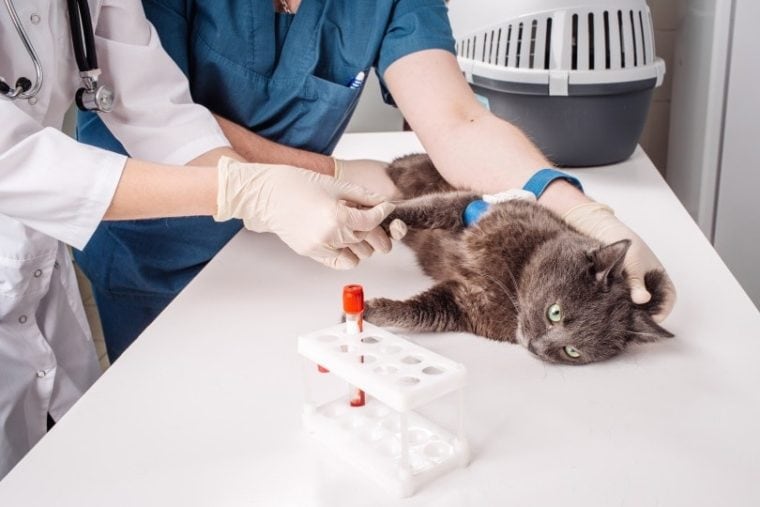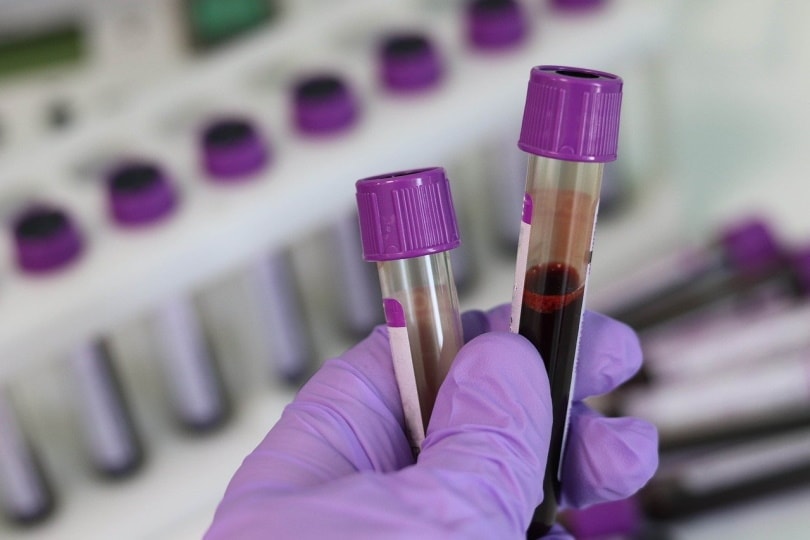
If your vet calls for a blood test, it can be hard to know what to expect. You are already dealing with keeping your cat calm while the vet takes a sample of blood and worrying about what the results will be—thinking about the cost on top of that might add even more stress. The cost of blood tests varies wildly, and from the outside it seems pretty opaque, they can go from $15 up to $250.
But once you know what kind of test your cat needs, you can usually get a pretty good estimate of what’s normal.
The Importance of Cat Blood Tests
If you think there’s something wrong with your cat, a blood test is often the first line of investigation. Examining a blood sample can tell your vet a ton about what’s happening with your cat’s health. Just looking at blood composition can tell you so much about blood cells, blood sugar, organ function, electrolytes, blood proteins, and more. With these results and your cat’s symptoms, your vet might be able to find out what’s wrong right away, or at least narrow down the field.
There are a few other reasons to get a blood test. Some vets recommend that senior cats get annual blood tests to check for common problems. Cats also get blood tests before surgeries to make sure there isn’t anything that would cause unexpected problems during the surgery or recovery.
How Much Does a Blood Test Cost?
Because there are so many different types of blood tests, the cost varies widely based on what tests are being done. Some tests require very little equipment or time to perform while others are more intensive, so you can expect costs to depend on the test. One of the cheapest and most common tests is a blood glucose test, which counts blood sugar levels. This often costs as little as $15. A few other common tests and their purposes and estimated cost are listed in the table below.
| Blood test | Purpose | Cost |
| Blood glucose | Measures blood sugar levels; though a more comprehensive blood test may be recommended to diagnose diabetes | $15–$50 |
| CBC | Counts white and red blood cells to assess conditions like inflammation, infection, and anemia | $30–$75 |
| FELV/FIV test | Diagnoses of feline leukemia and feline immunodeficiency virus | $75–$150 |
| PCV | Measures red blood cells to and can indicate dehydration or anemia | $30–$100 |
| T4 | Measures thyroid hormone levels | $30–$100 |
| Serum chemistry | Measures electrolytes, enzymes, and blood proteins. Often part of a blood panel. | $100–$250 |
Blood tests are often combined into a blood work panel that can tell the vet several different things in one test. The cost of blood panels varies, but it is usually between $100 and $300 depending on your local vet’s costs and the tests included. As an example, this office in Boise, ID offers two levels of blood panels, with the basic panel costing $110 and the more extensive one costing $160.
In addition to the tests being run, your local vet’s capacities can alter the price significantly. Many small vets need to contract blood work out to a lab or larger animal hospital, which can increase the price by as much as $100 compared to analyzing the test in-house. In addition, demand and cost of living will affect pricing. If the price is higher than what you expected, consider asking for a quote from other vets in your area to get an idea of what is normal.

Additional Costs to Anticipate
Blood tests are usually used to diagnose health issues, and your vet may order other tests like urine tests at the same time. They might offer a discount for performing multiple tests during the same visit or they might not.
Blood tests often have office visit fees attached to them, especially if your cat also needs an examination. These fees can cost you around $50–$100.
Blood tests can be the first step towards discovering many different health issues. They are just a diagnostic tool and can’t treat ailments. Because of this, you can expect future costs as your vet treats any issues diagnosed via blood tests.
How Often Should My Cat Get Blood Tests?
Most of the time, your cat doesn’t need blood tests as part of a regular check-up. However, some vets recommend basic blood tests regularly, especially once your cat gets older. These tests can help your vet diagnose issues that don’t have visible symptoms.
Most blood tests are done as needed. You will usually see blood tests recommended if your cat is having a health problem that might be diagnosed by a blood test. In general, follow your vet’s advice about when your cat needs a blood test.
Does Pet Insurance Cover Blood Tests?
There’s not one standard for insurance coverage, and different blood tests might be covered by different insurers. Routine tests as part of a regular check-up are not usually covered by insurance plans, but diagnostic tests when your cat is showing signs of illness and tests given before surgery can be.
Some pet insurance covers all blood work, while others cover only a few common types of tests. Not all insurers cover pre-existing health conditions, so it is important to check with your insurance if your cat has had symptoms since before you bought insurance. It’s wise to talk to your insurance before any tests take place so you can see if that test is covered.

Blood Tests and Healthy Cats
Routine blood work is recommended in healthy cats as well.
At first glance, there’s not much correlation between a healthy lifestyle and needing blood work. But even though you can’t avoid all the problems that would call for a blood test, many of the most common tests are for issues that are affected by lifestyle. You can minimize the chances of your cat having diabetes, heart, and hormone problems by feeding your cat a healthy diet and encouraging exercise.
Preventative vet care is something else that can help your cat stay healthy and happy. Many diseases diagnosed by blood tests, like feline leukemia, can be avoided by keeping your cat up to date on vaccines.
Last Thoughts
It can be hard to predict the cost of blood work in cats, but overall, the many different types of blood tests will cost you a few hundred dollars at the very most, and often much less. These tests can be vital in helping your cat get the health treatment she needs.
Featured Image Credit: PRESSLAB, Shutterstock







